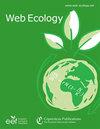跨代诱导对植物适口性的累积效应
IF 2.4
3区 环境科学与生态学
Q2 ECOLOGY
引用次数: 7
摘要
摘要草食损害可诱导植物产生抗草食性状。然而,关于这些诱导性状如何在诱导后的多代中影响植物的适口性(决定食草动物损害的可能性和程度的重要因素),或者跨代诱导的影响在通才和专才食草动物之间是否存在差异,几乎没有数据。本研究采用适口性作为衡量野生萝卜跨代防御诱导效应的指标。我们进行了一项温室实验,以确定多面手(蛞蝓)和专门手(白白菜蝴蝶的毛虫)食草动物对野生萝卜的偏好是否取决于经历过食草的前几代的数量。我们发现,对于多面手蛞蝓来说,过去经过两次或三次诱导的植物适口性较低,而对专门食草动物的适口性不受跨代诱导的影响。我们得出的结论是,植物祖先在多代中所经历的食草历史可能在其防御一般食草动物的能力中发挥了重要作用,而不是与他们共同进化的专门食草动物。我们的研究结果表明,过去多次诱导可能对家族谱系的适口性产生的影响可以预期具有生态和进化意义。本文章由计算机程序翻译,如有差异,请以英文原文为准。
Cumulative effects of transgenerational induction on plant palatability to generalist and specialist herbivores
Abstract. Herbivore damage can induce anti-herbivore traits in plants. However, there
is little data regarding how these induced traits
affect a plant's palatability (an important factor in determining the
likelihood and magnitude of herbivore damage) across multiple generations
post-induction, or whether the effect of transgenerational induction differs
between generalist and specialist herbivores. Here we used palatability as a
measure of the effects of transgenerational defensive induction in wild
radish plants. We conducted a greenhouse experiment to determine whether
generalist (slugs) and specialist (caterpillars of the white cabbage
butterfly) herbivores' preference for wild radish differed depending on the
number of previous generations that experienced herbivory. We found lowered
palatability in plants with two or three inductions in their past in the case
of generalist slugs, while palatability to a specialist herbivore was not
affected by transgenerational induction. We conclude that the history of
herbivory experienced by a plant's ancestors over multiple generations may
play an important role in its ability to defend itself against generalist
herbivores, but not against the specialists with whom they have co-evolved.
Our findings suggest that the effects that multiple past inductions may have
on palatability down the family line can be expected to have ecological and
evolutionary implications.
求助全文
通过发布文献求助,成功后即可免费获取论文全文。
去求助
来源期刊

Web Ecology
Agricultural and Biological Sciences-Ecology, Evolution, Behavior and Systematics
CiteScore
4.60
自引率
0.00%
发文量
6
审稿时长
17 weeks
期刊介绍:
Web Ecology (WE) is an open-access journal issued by the European Ecological Federation (EEF) representing the ecological societies within Europe and associated members. Its special value is to serve as a publication forum for national ecological societies that do not maintain their own society journal. Web Ecology publishes papers from all fields of ecology without any geographic restriction. It is a forum to communicate results of experimental, theoretical, and descriptive studies of general interest to an international audience. Original contributions, short communications, and reviews on ecological research on all kinds of organisms and ecosystems are welcome as well as papers that express emerging ideas and concepts with a sound scientific background.
 求助内容:
求助内容: 应助结果提醒方式:
应助结果提醒方式:


